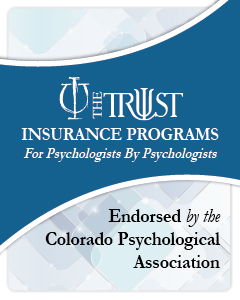2023 Fall Symposium: Suicide Prevention
Happy Hour/PAC Event to Follow at 4:30 p.m.
New Terrain Brewing Company - RSVP/Register
The 2023 CPA Fall Symposium's focus on suicide prevention is commendable and highlights the importance of addressing this critical public health issue. Suicide is a global concern that affects individuals, families, and communities across the nation. By dedicating a symposium to this topic, the CPA can contribute to raising awareness, sharing research findings, and promoting strategies to prevent suicide.
Confirmed topics and areas of discussion for the symposium include:
- Preventing Suicide in Peripartum and Perimenopausal People; Rebecca Richey, PsyD, LCSW, CAC III, MBA, Clinical Director, Colorado Women’s Collaborative Healthcare (1 CE)
- How to Utilize 988 in Colorado; Helen Littrell, PsyD, Crisis Program Director, Rocky Mountain Crisis Partners (1 CE)
- Suicide Prevention - Integrating Suicide Research, Evidence-Based Psychotherapy Interventions, Neuroscience, and Mindfulness; Geoff Smith, PsyD, Section Chief, Veterans Affairs (3 CEs)
- The Federal Landscape of Suicide Prevention; Julio C Abreu, Senior Director of Congressional and Federal Affairs, American Psychological Association Services, Inc.
Pricing:
- CPA Members: $185
- CPA Student Members: $75
- Non-Members: $285
See sponsor/exhibitor opportunities here.
9 a.m.- 10 a.m.
Preventing Suicide in Peripartum and Perimenopausal People
Description:
Suicide is the leading cause of postpartum maternal death and recently rose 6% among perimenopausal women (Wheeler, 2019). With a gender gap in healthcare and specialty women’s healthcare hard to come by, it is imperative that providers understand how to care for this vulnerable population. This session will educate multidisciplinary healthcare providers in the assessment and treatment of peripartum and perimenopausal suicide. The session will feature the complex interplay between hormones and suicidality, focusing on concrete skills each provider can use to ensure safety among their peripartum and perimenopausal patients.
Number of CE credits offered: 1
Program level: Intermediate
Learning Objectives:
- Participants will be able to identify risk and protective factors for suicide among peripartum and perimenopausal people.
- Participants will be able to discuss diversity, equity and inclusivity challenges and opportunities within assessment and treatment of suicidality among peripartum and perimenopausal people.
- Participants will understand the interplay of womxn’s hormones throughout the lifespan and the effect these may have on mental wellness and suicidality.
- Participants will be able to utilize real-world skills in assessing and treating suicidality among peripartum and perimenopausal people.
Speaker: Rebecca Richey, PsyD, LCSW, CAC III, MBA
 Dr. Rebecca Richey is the Clinical Director of Colorado Women’s Collaborative Healthcare. She previously worked as an Assistant Professor in the University of Colorado's School of Medicine (CUSOM) as the Director of Behavioral Health for the Women's Integrated Services in Health Clinic. She has been a clinician for nearly 20 years and is passionate about integrated care, leadership and advocacy in psychology, and women's health. She specializes in psychological testing for women and girls, including all neurodivergence diagnoses. She is also working toward licensure as a prescribing psychologist in Colorado.
Dr. Rebecca Richey is the Clinical Director of Colorado Women’s Collaborative Healthcare. She previously worked as an Assistant Professor in the University of Colorado's School of Medicine (CUSOM) as the Director of Behavioral Health for the Women's Integrated Services in Health Clinic. She has been a clinician for nearly 20 years and is passionate about integrated care, leadership and advocacy in psychology, and women's health. She specializes in psychological testing for women and girls, including all neurodivergence diagnoses. She is also working toward licensure as a prescribing psychologist in Colorado.
10 a.m. - 11 a.m.
How to Utilize 988 in Colorado
Description:
Psychologists regularly refer to a crisis line for after hours or additional client support, but what happens when you or a client calls the crisis line? Increase your understanding and confidence in crisis line services and have a chance to ask questions to the Crisis Program Director of Colorado’s Crisis Call Center, Rocky Mountain Crisis Partners. Attendees will receive an informational presentation from Helen Littrell, PsyD (Crisis Program Director of Rocky Mountain Crisis Partners [RMCP]) about the qualifications, training, and support crisis center staff receive; recommendations on how to utilize the line as a psychologist; and the differences between calling a local crisis line verse the national crisis line from the perspective of Colorado. The goal of this session is to increase participants' confidence in utilizing a crisis line as a psychologist and appropriately referring clients/patients. RMCP is in the unique position to answer these questions due to being the only provider for Colorado Crisis Services and 988 in the state of Colorado and being one for four states that was deemed best prepared to answer the national crisis line in 2022. Time will then be made available for answering audience questions, giving participants the opportunity to tailor the session to specifically address their concerns and barriers to accessing a crisis line.
Number of CE credits offered: 1
Program level: Introductory
Learning Objectives:
- Improve insight and confidence of crisis line services and how to best utilize a crisis line as a psychologist
- Understand how to use local crisis lines verse the national crisis line (988)
- Increase ability to appropriately refer and answer client questions about calling a crisis line
Speaker: Helen Littrell, PsyD
 Dr. Helen Littrell’s interest in suicide prevention and crisis intervention started in 2012, when she was a volunteer for Lifeline in Australia. Dr. Littrell holds Bachelor’s degrees in Psychology and Commerce from the Australian National University, and a Master of Arts and Doctorate in Clinical Psychology from the University of Denver. She became a Licensed Psychologist in 2021. Dr. Littrell was a Suicide Prevention Coordinator at a CMHC where she rebuilt and facilitated suicide prevention focused training programs, revamped an acute treatment unit’s group structure and content, and provided consultation to implement the Zero Suicide Initiative. Since 2021 Dr. Littrell has worked at Rocky Mountain Crisis Partners as a Crisis Program Director. She was a leader in coordinating a successful 988 launch.
Dr. Helen Littrell’s interest in suicide prevention and crisis intervention started in 2012, when she was a volunteer for Lifeline in Australia. Dr. Littrell holds Bachelor’s degrees in Psychology and Commerce from the Australian National University, and a Master of Arts and Doctorate in Clinical Psychology from the University of Denver. She became a Licensed Psychologist in 2021. Dr. Littrell was a Suicide Prevention Coordinator at a CMHC where she rebuilt and facilitated suicide prevention focused training programs, revamped an acute treatment unit’s group structure and content, and provided consultation to implement the Zero Suicide Initiative. Since 2021 Dr. Littrell has worked at Rocky Mountain Crisis Partners as a Crisis Program Director. She was a leader in coordinating a successful 988 launch.
11 a.m. - 12 p.m. and continuing after lunch from 1 p.m. - 3 p.m.
Suicide Prevention - Integrating Suicide Research, Evidence-Based Psychotherapy Interventions, Neuroscience, and Mindfulness
Description:
Supporting people struggling with suicidal thinking and behavior is one of the most daunting aspects of practice facing Psychologists. This (3) hour workshop will provide instruction and practice with useful concepts and tools for Psychologists to help clients understand the nature of their suicidal thinking, how to unhook from the that struggle, and then move toward coping differently while building purpose, connection, and meaning as new sustainable protective factors. An overview of current rates of prevalence, general suicide risk factors, and key research by Thomas Joyner will provide a conceptual foundation and inflection points for suicide prevention interventions. Behavioral Chain Analysis (BCA) and the Safety Planning Intervention (SPI) will be thoroughly discussed as vital core methods. These tools are borne of cognitive behavioral science, and yet can be enhanced by specific Evidence Based Psychotherapy (EBP) interventions. EBPs reviewed in this presentation will include Cognitive Behavior Therapy (CBT) Acceptance Commitment Therapy (ACT) Dialectical Behavior Therapy (DBT), and Motivational Interviewing (MI) among others. Workshop Participants will practice in small groups applying how EBPs can supercharge the BCA and SPI processes. Recent findings in cognitive neuroscience, theories of evolutionary psychology, and mindfulness practice will then be discussed to anchor recommended suicide prevention clinical interventions. Specific attention will be paid to neuro-plasticity and predictive cognition, kinship reciprocity, and mindfulness exercises for later clinical implementation. Participants will finally integrate knowledge through practice in dyads using their own clinical examples to build familiarity and confidence.
Number of CE credits offered: 3
Program level: Intermediate
Learning Objectives:
- Learn (2) facts about current global and US prevalence of suicidal behavior and correlated factors
- Learn the (3) Main findings of Thomas Joyner correlated with completed Suicide events
- Learn and practice the core steps of a comprehensive Behavioral Chain Analysis (BCA) and the Safety Planning Intervention (SPI)
- Identify (3) Evidence Based Psychotherapy (EBP) Interventions and how they map onto the Safety Planning Intervention (SPI) and target specific general and Joyner suicide risk factors
- Identify (1) core concepts each from cognitive neuroscience research, evolutionary psychology theory, and mindfulness experience you will integrate into clinical practice and why they matter for suicide prevention
Speaker: Geoff Smith, PsyD
 Dr. Geoff Smith has been a Clinical Psychologist and program administrator working with adults with acute and chronic mental illness since 2001. His experience in clinical care, management, and program development spans Educational Settings, Community Mental Health Center, and Veterans Affairs. His current title is Section Chief of Behavioral Medicine, Acute and Residential Mental Health Programs in the Eastern Colorado Healthcare System (Denver VA). This position oversees programs including the secure Inpatient Mental Health Unit, (2) Domiciliary programs addressing homelessness and PTSD, Emergency MH Care, Gero-psychology, Neuropsychology, and various Health Psychology teams.
Dr. Geoff Smith has been a Clinical Psychologist and program administrator working with adults with acute and chronic mental illness since 2001. His experience in clinical care, management, and program development spans Educational Settings, Community Mental Health Center, and Veterans Affairs. His current title is Section Chief of Behavioral Medicine, Acute and Residential Mental Health Programs in the Eastern Colorado Healthcare System (Denver VA). This position oversees programs including the secure Inpatient Mental Health Unit, (2) Domiciliary programs addressing homelessness and PTSD, Emergency MH Care, Gero-psychology, Neuropsychology, and various Health Psychology teams.
Past projects include developing Veteran programs for Peer Support Specialists providing health coaching on an inpatient psychiatric unit, developing community contracted Psychiatric step-down services, and using evidence based psychotherapy for suicide prevention. Current research publication and conference presentation activities focus on Acceptance and Commitment Therapy for Suicide Prevention among Veterans and Whole Health implementation in Behavioral Science. He provides numerous seminars and presentations across various MH staff disciplines, supervises the inpatient psychiatric unit practicum student each year, and is a faculty instructor for the Psychiatry Department at the University of Colorado Health Sciences Center. Dr. Smith is the Psychological Incident Commander for the Denver VA Critical Incident Response Team. He was detailed 3 times to the Denver VA Incident Management Team implementing various arms of the pandemic response.
3 p.m. to 4 p.m.
The Federal Landscape of Suicide Prevention
Description:
- Legislative Track
- Record Investments for 988
- Investments for MH/BH Portfolio
- Bills in the 11th Congress to Follow
- MHLG Coordination
- SP Work at the Agencies
- 988 Launch July 2022
- 988 and Crisis Care Coordination
- SAMHSA SP Efforts
- CDC SP Portfolio
Speaker: Julio C Abreu, Senior Director of Congressional and Federal Affairs, American Psychological Association Services, Inc.
 Julio C Abreu joined APA in April 2022 as a member of the Advocacy team. Julio comes to APA after having worked in government and advocated for public health, access to health and disability services and civil rights for nearly thirty years. Julio has held top leadership roles in the behavioral health community, the broader health community, and the disability community.
Julio C Abreu joined APA in April 2022 as a member of the Advocacy team. Julio comes to APA after having worked in government and advocated for public health, access to health and disability services and civil rights for nearly thirty years. Julio has held top leadership roles in the behavioral health community, the broader health community, and the disability community.
Prior to joining APA, Julio worked at Mental Health America (MHA), where he managed MHA’s legislative, policy and grassroots agenda for fifteen years. Julio honed his coalition-building skills in navigating the various systems (health, health access, employment, housing, corrections, et al) in which people with mental illness intersect. Julio has held leadership positions in a variety of coalitions, including: President of the Coalition for Health Funding; Co-Chair and Board Member of the Mental Health Liaison Group; and a Board Member of the Consortium for Citizens with Disabilities (CCD).
Register For The Symposium
4:30 p.m. Happy Hour/PAC Event - New Terrain Brewing Company - RSVP/Register

 Prev Month
Prev Month View Month
View Month Search
Search Go to Month
Go to Month Next Month
Next Month Dr. Rebecca Richey is the Clinical Director of Colorado Women’s Collaborative Healthcare. She previously worked as an Assistant Professor in the University of Colorado's School of Medicine (CUSOM) as the Director of Behavioral Health for the Women's Integrated Services in Health Clinic. She has been a clinician for nearly 20 years and is passionate about integrated care, leadership and advocacy in psychology, and women's health. She specializes in psychological testing for women and girls, including all neurodivergence diagnoses. She is also working toward licensure as a prescribing psychologist in Colorado.
Dr. Rebecca Richey is the Clinical Director of Colorado Women’s Collaborative Healthcare. She previously worked as an Assistant Professor in the University of Colorado's School of Medicine (CUSOM) as the Director of Behavioral Health for the Women's Integrated Services in Health Clinic. She has been a clinician for nearly 20 years and is passionate about integrated care, leadership and advocacy in psychology, and women's health. She specializes in psychological testing for women and girls, including all neurodivergence diagnoses. She is also working toward licensure as a prescribing psychologist in Colorado. Dr. Helen Littrell’s interest in suicide prevention and crisis intervention started in 2012, when she was a volunteer for Lifeline in Australia. Dr. Littrell holds Bachelor’s degrees in Psychology and Commerce from the Australian National University, and a Master of Arts and Doctorate in Clinical Psychology from the University of Denver. She became a Licensed Psychologist in 2021. Dr. Littrell was a Suicide Prevention Coordinator at a CMHC where she rebuilt and facilitated suicide prevention focused training programs, revamped an acute treatment unit’s group structure and content, and provided consultation to implement the Zero Suicide Initiative. Since 2021 Dr. Littrell has worked at Rocky Mountain Crisis Partners as a Crisis Program Director. She was a leader in coordinating a successful 988 launch.
Dr. Helen Littrell’s interest in suicide prevention and crisis intervention started in 2012, when she was a volunteer for Lifeline in Australia. Dr. Littrell holds Bachelor’s degrees in Psychology and Commerce from the Australian National University, and a Master of Arts and Doctorate in Clinical Psychology from the University of Denver. She became a Licensed Psychologist in 2021. Dr. Littrell was a Suicide Prevention Coordinator at a CMHC where she rebuilt and facilitated suicide prevention focused training programs, revamped an acute treatment unit’s group structure and content, and provided consultation to implement the Zero Suicide Initiative. Since 2021 Dr. Littrell has worked at Rocky Mountain Crisis Partners as a Crisis Program Director. She was a leader in coordinating a successful 988 launch. Dr. Geoff Smith has been a Clinical Psychologist and program administrator working with adults with acute and chronic mental illness since 2001. His experience in clinical care, management, and program development spans Educational Settings, Community Mental Health Center, and Veterans Affairs. His current title is Section Chief of Behavioral Medicine, Acute and Residential Mental Health Programs in the Eastern Colorado Healthcare System (Denver VA). This position oversees programs including the secure Inpatient Mental Health Unit, (2) Domiciliary programs addressing homelessness and PTSD, Emergency MH Care, Gero-psychology, Neuropsychology, and various Health Psychology teams.
Dr. Geoff Smith has been a Clinical Psychologist and program administrator working with adults with acute and chronic mental illness since 2001. His experience in clinical care, management, and program development spans Educational Settings, Community Mental Health Center, and Veterans Affairs. His current title is Section Chief of Behavioral Medicine, Acute and Residential Mental Health Programs in the Eastern Colorado Healthcare System (Denver VA). This position oversees programs including the secure Inpatient Mental Health Unit, (2) Domiciliary programs addressing homelessness and PTSD, Emergency MH Care, Gero-psychology, Neuropsychology, and various Health Psychology teams. Julio C Abreu joined APA in April 2022 as a member of the Advocacy team. Julio comes to APA after having worked in government and advocated for public health, access to health and disability services and civil rights for nearly thirty years. Julio has held top leadership roles in the behavioral health community, the broader health community, and the disability community.
Julio C Abreu joined APA in April 2022 as a member of the Advocacy team. Julio comes to APA after having worked in government and advocated for public health, access to health and disability services and civil rights for nearly thirty years. Julio has held top leadership roles in the behavioral health community, the broader health community, and the disability community. Export Event
Export Event 